To create a herb oil infusion, steep herbs in carrier oil to extract their flavours and aromas. This involves heating the oil with the herbs to release their essential oils and allowing it to steep.
You can use the infused oil for cooking, skincare, or as a natural remedy. Common herbs for infusions include rosemary, thyme, basil, and lavender.
Here we will walk you through everything you need about herb oil infusions – from understanding their benefits to selecting the best oils for your infusions. We’ll also provide five easy DIY methods to make your own Freshly Picked Herb Infused oils straight from your garden. Get ready to impress your taste buds!
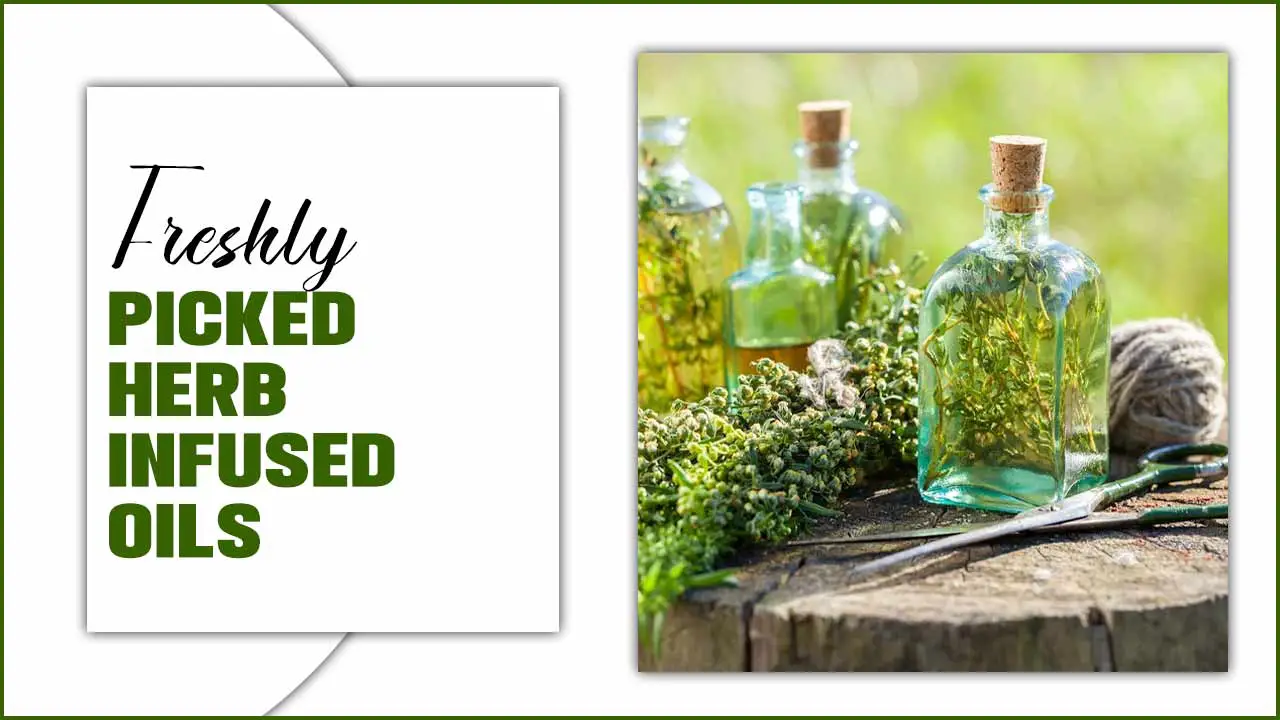
5 Easy DIY Methods To Make Freshly Picked Herb Infused Oils
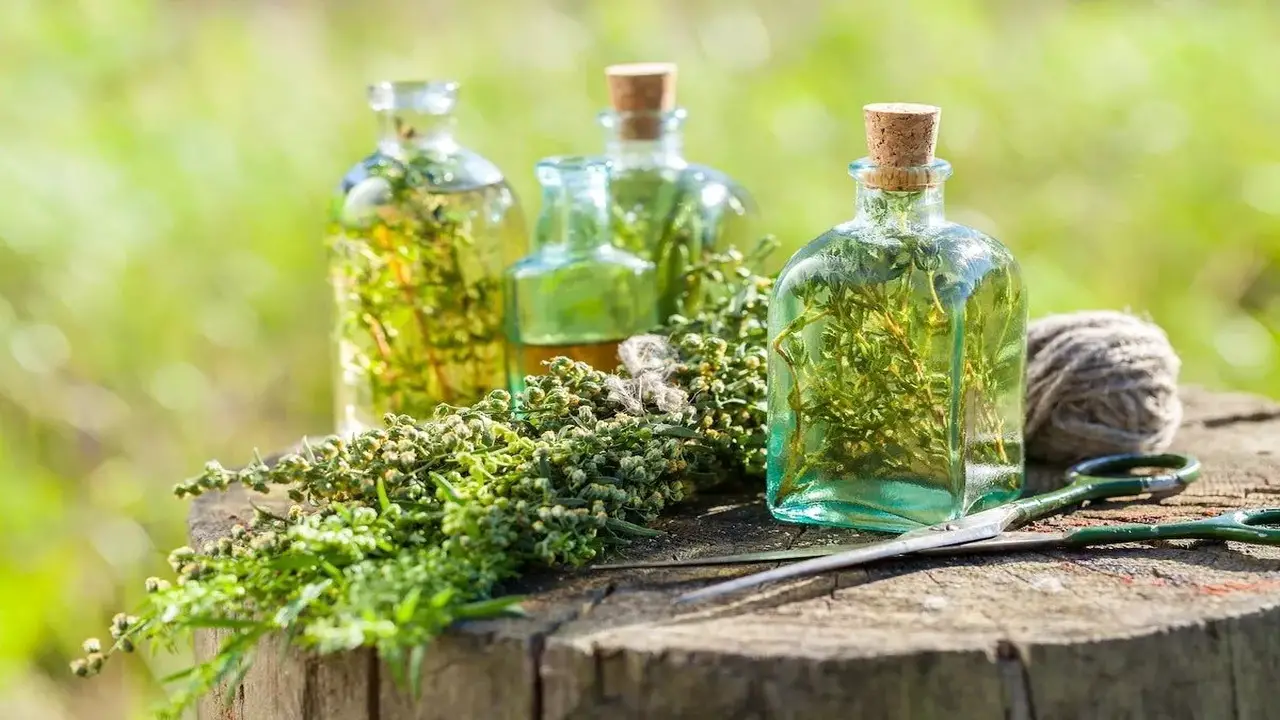
To create your own freshly picked herb-infused oils, you have a variety of easy DIY methods to choose from. Select your preferred fresh herbs like rosemary, basil, thyme, or mint. Ensure the herbs are thoroughly washed and dried to remove dirt or moisture.
Once your herbs are prepared, it’s time to start infusing the oil. You can use different methods, such as sun infusion, stovetop infusion, slow cooker infusion, microwave infusion, or cold infusion, based on your preference. Here are 5 Easy DIY methods to make Freshly Picked Herb Infused Oils.
1. Gather Your Herbs And Oils
Gathering the perfect combination of fresh herbs and high-quality oils is essential for creating deliciously aromatic and flavorful herb-infused oils. Select your desired herbs, such as rosemary, thyme, lavender, or basil, based on the flavours and aromas you wish to infuse. Ensure you pick the herbs freshly, remove any dirt or debris, and dry them thoroughly to prevent moisture from causing spoilage.
Next, choose a premium-quality carrier oil like extra virgin olive oil or sunflower oil to enhance the flavours of the herbs. It is important to use a clean and dry glass jar as the container for your herbs and oils.
Prior to adding them to the jar, gently wash and dry the herbs to ensure their freshness. Submerge the herbs fully in the oil to allow for optimal extraction and infusion of their aromatic oils.
2. Prepare The Herbs
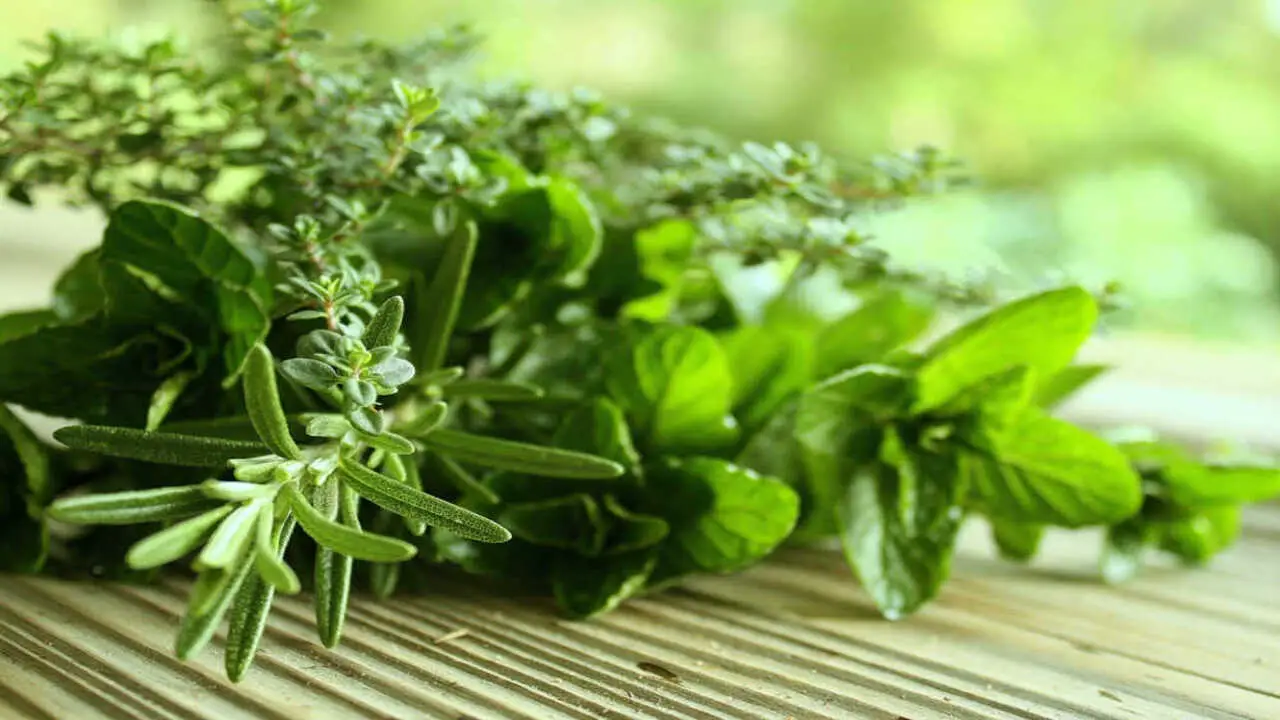
When preparing the herbs for your herb-infused oil, starting with fresh, clean herbs is essential. Gather your chosen herbs, such as basil, rosemary, thyme, or mint, ensuring they are free from dirt and debris. After rinsing them under cold water, gently pat them dry to remove any excess moisture.
Chop or tear the herbs into smaller pieces to release the flavours and aromas. Place these chopped herbs into a clean glass jar or bottle with a tight-fitting lid. By following these steps, you can ensure that your infusion process will yield the desired results.
3. Infuse The Oil
Infusing oil with freshly picked herbs is a great way to add extra flavour to your culinary creations. Selecting your favourite herbs, such as rosemary, thyme, or basil, you can customize the infusion to suit your preferences. Start by washing the herbs to remove dirt or debris, then pat them dry with a paper towel.
Next, heat your choice of oil, such as olive or sunflower, over low heat until it reaches around 180°F. Place the dried herbs into a clean glass jar or bottle, and pour the warm oil over them, ensuring the herbs are completely submerged.
4. Strain The Oil
After completing the infusion process, straining the oil is crucial to ensure a smooth and clear final product. This step helps remove any solid particles and maximizes the flavor and aroma of the freshly picked herb-infused oils.
Use a fine-mesh strainer or cheesecloth placed over a clean glass container to strain the oil. Slowly pour the infused oil through the strainer, pressing down on the herbs to extract any remaining oil.
This process results in a high-quality oil infusion that can be used for various purposes such as cooking, skincare, or making balms and salves. Remember to store the strained oil in a cool, dark place to maintain its freshness and flavor for longer.
5. Store The Oil
To ensure a smooth and clear final product, it is important to strain out the solid particles after infusing the oil with herbs. Straining will remove any remaining plant material and enhance the flavor and aroma of your freshly picked herb-infused oils. Using a fine-mesh strainer or cheesecloth, carefully pour the oil through the strainer into a clean glass container.
You can press down on the herbs with a spoon or spatula to extract any remaining oil, maximizing the infusion process. For optimal freshness and flavor, store the strained-infused oil in a cool, dark place like a pantry or cupboard.
Benefits Of Making Freshly Picked Herb-Infused Oils
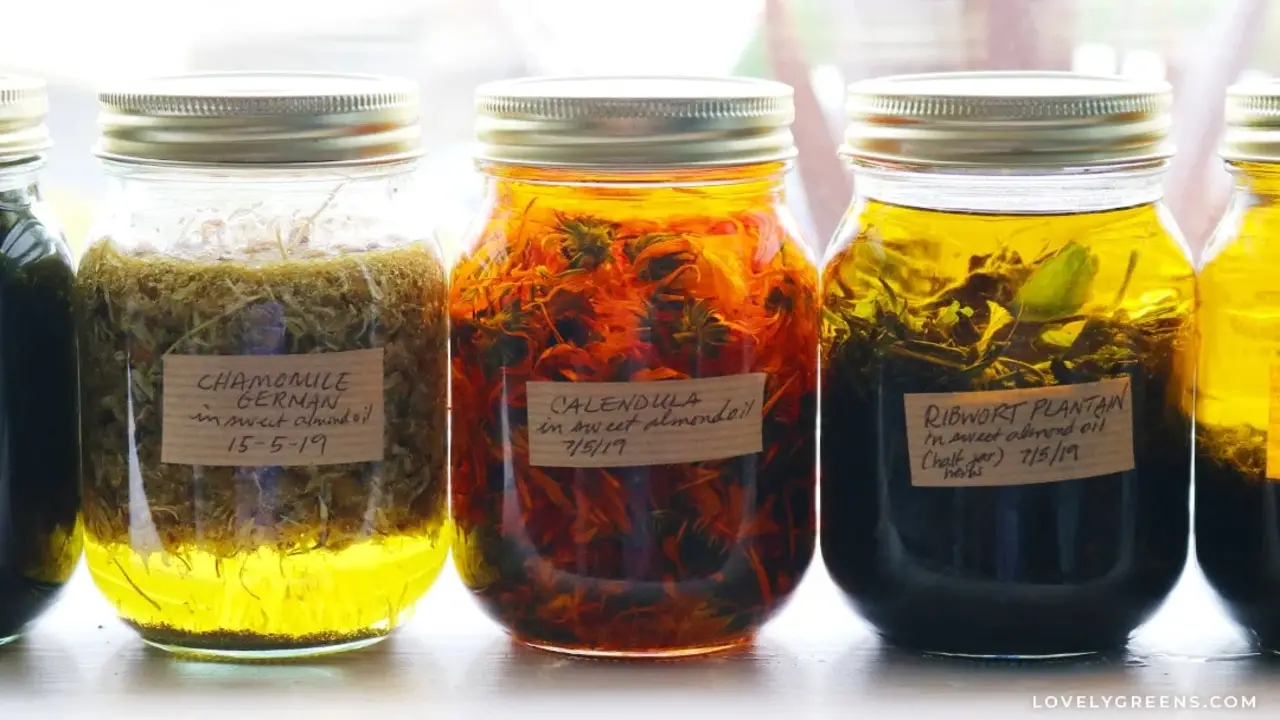
Making herb-infused oils using freshly picked herbs and extra virgin olive oil greatly enhances your dishes, skincare routine, and aromatherapy practices. Unlike store-bought options, creating your own herb-infused oil gives you control over the quality and ingredients used.
By selecting the right herbs and carrier oil, you can create a unique infusion with myriad health benefits. Rosemary can provide antioxidant properties, lavender can promote relaxation, and basil can add a flavorful twist to your culinary creations. The infusion process allows the natural compounds from the herbs to blend seamlessly with the oil, resulting in a potent and versatile product.
Not only do these herb-infused oils pack a punch in terms of flavour and fragrance, but they also help extend the shelf life of your herbs. By infusing them into oil, you can preserve their freshness and flavours for longer.
To store these precious oils, choose a dark-coloured glass container and keep it in a cool, dark place. Properly labelled and stored, your herb-infused oils can last up to 6 months, though using them within 3-4 months is recommended for the best taste experience.
Tips For Selecting The Best Oil For Infusions
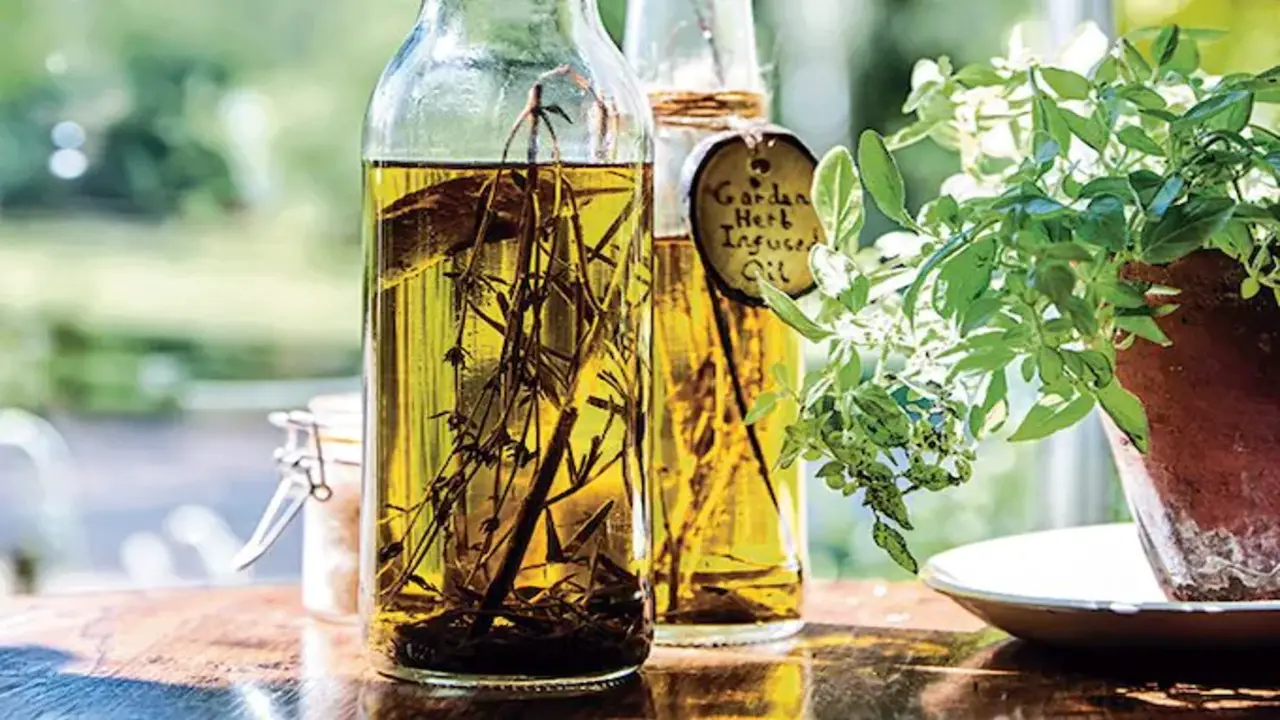
When selecting the best oil for infusions, a few essential tips can help enhance your results. Start by choosing a high-quality oil with a neutral flavor, like olive oil or sunflower oil.
These oils provide a solid foundation for infusions, allowing the flavors of the freshly picked herbs to shine through. Consider the smoke point of the oil as well. Opt for an oil that can withstand heat during the infusion process without burning.
Cold-pressed or extra virgin oils are often recommended for their superior flavor and nutrient content. The intended use of the infused oil should also play a role in your selection. Different oils have different flavors and uses, so choose one that complements your desired outcome.
Finally, keep any dietary restrictions or preferences in mind. For those with allergies, using nut-free oils is essential. By following these tips, you can ensure that your infused oils are of the highest quality and flavor.
Storing And Using Your Herb-Infused Oils
Properly storing and using your freshly picked herb-infused oils is crucial for maintaining their freshness and flavor. After the infusion process, transfer the oil into a clean, airtight container like a mason jar and store it in a cool, dark place.
This ensures the oils remain potent and prevents spoilage. To strain the oil, use a cheesecloth or coffee filter to remove any plant particles or impurities. Adding a few drops of vitamin E oil can extend the shelf life of your herb-infused oil.
Herb-infused oils are versatile and can be used in various ways. For cooking, drizzle them over salads, pasta, or roasted vegetables for extra flavour. They can also be used as a base for dressings and marinades. Remember to dilute them with a carrier oil like sweet almond or jojoba oil to prevent skin irritation when using them in skincare or as natural remedies.
Experimenting with different herbs and blends, such as basil, rosemary, or lavender oil, can create unique infused oil flavours. Don’t forget to label your infused oils with the creation date and herbs used for easy reference.
Conclusion
Making your own freshly picked herb-infused oils is not only a fun and rewarding experience, but also a great way to enhance the flavours of your dishes and enjoy the numerous health benefits herbs have to offer. You can easily create these aromatic oils at home by following our simple DIY methods for making Freshly Picked Herb Infused Oils.
Whether you use them in cooking, as massage oils, or for medicinal purposes, herb-infused oils are a versatile addition to your pantry. So get creative in the kitchen, and explore the delicious world of freshly picked herb-infused oils. Your taste buds will thank you.
Frequently Asked Questions
1.Can You Infuse Oil With Fresh Herbs?
Ans: Yes, it is possible to infuse oil with fresh herbs. For optimal results, select herbs like rosemary, thyme, or basil that have robust flavors. Prior to adding them to the oil, ensure the herbs are washed and dried. Allow the herbs to steep in the oil for a few weeks to extract maximum flavor.
2.How Long To Infuse Fresh Herbs In Oil?
Ans: You should infuse fresh herbs in oil for a period of around 2-4 weeks. The longer you allow the herbs to infuse, the more intense the flavor. Before adding the herbs to the oil, ensure they are clean and dry. To preserve the freshness and flavor, store the infused oil in a cool and dark location.
3.Do Herb Infused Oils Go Bad?
Ans: Yes, herb-infused oils can go bad if not stored correctly. Their shelf life is usually 1-3 months. Look out for signs like a rancid smell, of taste, or mould growth. To prolong their freshness, store them in a cool, dark place and handle with clean utensils.
4.What Oil Is Best For Infusing Herbs?
Ans: The ideal oil for infusing herbs is usually a neutral oil with a high smoke point, like olive or grapeseed oil. Olive oil is commonly used due to its mild flavour and versatility. Coconut oil can be used but solidifies at cooler temperatures. Avoid strong-flavoured oils like sesame or walnut, as they may overpower the herbs’ taste.
5.What Plants Should I Choose For Herbal Infused Oil?
Ans: When selecting plants for herbal infused oil, opt for herbs like rosemary, lavender, thyme, or basil, known for their aromatic and medicinal properties. Ensure they are fresh and undamaged. Consider the specific benefits and flavours you desire, and don’t be afraid to experiment with different herb combinations for unique infused oil creations.

I’m a writer and blogger who loves to talk about entertainment, culture, and relationships. I love to share my thoughts and insights on these topics, and I’m always looking for new ways to engage with my readers. I’m also a big fan of learning new things, so I’m always exploring new areas of interest.
